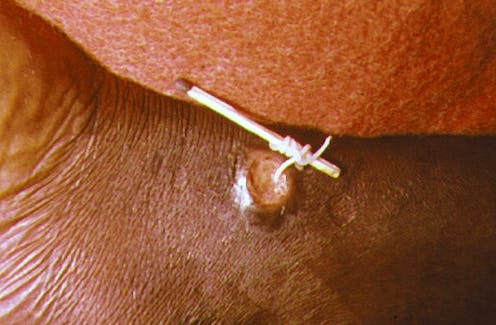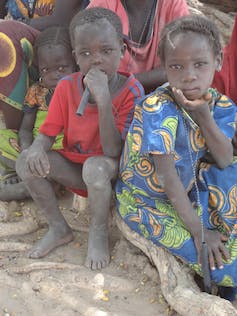
A painful, parasitic disease that once infected 3.5 million people per year is tantalizingly close to being eradicated.
On Jan. 24, 2023, The Carter Center, a nonprofit founded by former U.S. President Jimmy Carter, announced that “Guinea worm is poised to become the second human disease in history to be eradicated,” having recorded just 12 cases worldwide in 2022. It represents the lowest annual figure since 1986, when the Carter Center began leading global efforts to eradicate Guinea worm disease.
I have been working as a parasitologist for over two decades. I know the suffering that parasitic diseases like Guinea worm infections inflict on humanity, especially on the world’s most vulnerable and poor communities. My own research on African sleeping sickness – a deadly disease caused by a parasite carried by tsetse flies – has shown me how difficult it is to fight these diseases.
Thanks to a massive global effort, Guinea worm is now almost gone. However, humanity has been tantalizingly close to fully eradicating Guinea worm for many years. To take the final step from almost gone to fully eradicated is not easy, but with patience and vigilance, it is possible.
Table of Contents
A painful and persistent parasite
Guinea worms are parasitic nematodes that infect humans and a few other animals. They live in ponds, rivers and creeks all across Africa but are mostly endemic to sub-Saharan Africa.
A Guinea worm infection is a nasty experience. The worm mainly infects people after they drink water that is contaminated with tiny crustaceans called copepods that are infected with worm larvae. Most people don’t realize they are infected for about a year – roughly the time it takes for the larvae to burrow their way out of the stomach and into the abdominal cavity, develop into adults and mate. Once the females mature into pregnant worms, the horror show begins.
The pregnant worms must get back to the water to give birth, so they crawl down to the lower leg or foot. Once there, they burrow out through an incredibly painful blister in a process that can take weeks. The intense pain causes people to plunge their leg into water to get relief, and this is when the worm expels her larvae, starting the cycle anew.
There are no vaccines or drugs for Guinea worm. The current best treatment is very low-tech: treat the wound and slowly extract the worm over several painful weeks. Due to the intense pain, infected adults cannot work or provide for their families. Infected kids miss school and fall behind on their education. Though there are usually no long-term complications, infection confers no immunity, so people can get infected repeatedly over their lifetimes, too.

CDC Global/Wikimedia Commons, CC BY
Path to eradication
Guinea worm is awful, so I welcome any news of removing it from the list of diseases that affect people. But alongside hope, a healthy dose of realism is needed: Eradicating any disease is difficult. So far, humanity has succeeded only with smallpox, which was eradicated with the help of vaccines in the late 1970s after 200 years of effort.
A disease like Guinea worm is a distinctly different challenge. Eradication will not come from a medical solution like a pill or vaccine. Instead, people will have to change their behavior. The ideas are simple, but that does not mean this will be easy.
The Guinea worm eradication program has employed a two-part strategy to interrupt the Guinea worm’s transmission cycle. The first part was to prevent people from getting infected from contaminated water and food. The program launched educational campaigns, ran surveillance programs and distributed millions of tools – like filtration cloths, filters and chemical water treatments – for people to secure clean water.
The second part of the plan was aimed at preventing reintroduction of the parasite into the environment. Again, education programs were a key component, but so were Guinea worm treatment centers. These centers acted as places where infected people and their families could receive care, food and shelter during the long treatment process. By giving infected people a place to stay, treatment centers prevent a person from putting their leg into a body of water and inevitably releasing the larva.
A difficult last step
Since the eradication effort began in the mid-1980s, annual Guinea worm infections have fallen from the millions down to the dozens. But the final push to zero has been difficult and slow. In 2015, there were just 22 recorded cases, but infections have stayed in the low double-digits since then.
The massive drop in Guinea worm cases showed that this strategy was working, but there was a complication. In 2020, researchers discovered that a Guinea worm outbreak in the Central African country of Chad was driven by infected dogs, adding a new set of challenges to interrupting the transmission cycle. This led to public health officials returning to the field, increasing surveillance and urging people to report and contain infected dogs.
These many eradication efforts since 2015 have slowly brought case numbers down to the current record low of 12 total cases.
As the world approaches zero cases of Guinea worm disease, the laborious epidemiological detective work of chasing down infection reports and finding hidden water sources gets tougher. Some of the few remaining communities affected by Guinea worm are nomadic or very remote. And as Guinea worm infections grow rare, vigilance can wane and people revert to their old ways, opening the door for Guinea worm to reemerge.
The final push to full eradication will be a challenge that requires patience and faith on the part of institutions and governments supporting the effort. But it also requires that millions of people living in endemic areas do what they can to break the transmission cycle and kick Guinea worm out for good.
![]()
Kimberly Paul receives funding from the National Institutes of Health.























